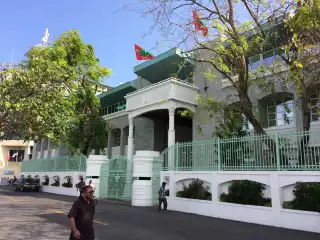
A prominent voice in the Maldives’ tourism sector and CEO of Capital Travel & Tours, Yoosuf Riffath has taken to social media platform ‘X’ with a sobering observation regarding the island nation’s tourist accommodation occupancy levels.
In his post, Riffath highlighted that during his recent visits, he made a deeply concerning observation. As such, he stressed that occupancy rates have reduced by 30 to 35 percent.
Riffath noted that this is unprecedented for the archipelagic nation, and that investor confidence in the Maldives has notably been fading as well.
“We need urgent and decisive action now.”
Yoosuf Riffath, CEO of Capital Travel & Tours.
Today is a special day for me personally. However what I have witnessed during my recent resort visits is deeply concerning . Occupancy rates have reduced by 30-35%. This is unprecedented for our island nation. Investor confidence in the Maldives is fading. We need urgent and… pic.twitter.com/N9Mhfyk7Uy
— Yoosuf Riffath (@YRiffath) June 23, 2025
Riffath’s remarks come at a time of growing concern within the tourism industry, one that forms the backbone of the island nation’s shaky economy. While the Maldives continues to attract high numbers of zealous travelers, there is a noticeable shift in where tourists are choosing to stay.
Increasingly, some believe travelers are opting for more budget-friendly accommodations such as guesthouses and hotel across local islands, as opposed to the luxury resorts that have long define the Maldivian tourism brand.
However, according to the latest statistics publicized by the Ministry of Tourism and Environment on June 24, 72.1 percent of tourists, amounting to 775,125 arrivals, still choose to stay at the nation’s upscale resorts. 243,883 tourists make up 22.7 percent of the tourists who stayed at guesthouses, 30,103 tourists make up 2.8 percent of the tourists who stayed at hotels, 24,771 tourists make up 2.3 percent of the tourists who stayed at liveaboard vessels and 822 who stayed at other facilities during this period.
This evolving pattern of travel behavior signals both opportunity and concern. While the rise of guesthouse tourism offers local island economies a new revenue stream, the substantial drop ion resorts occupancy threatens to ripple across multiple sectors including fisheries, construction, aviation and beyond.
Tourism experts are calling for urgent interventions, among which include increased government-led marketing initiatives, new international travel agreements and fiscal relief packages to support resort operators. Several have also urged a re-evaluation of the Maldives’ presence and strategy in global travel trade fairs, especially in traditional source markets like Europe and China, where confidence appears to be waning.
While industry experts stressed that there is no clear consensus on whether this downturn is short-term or reflective of a more permanent shift, many believe global economic slowdowns, evolving travel preferences and regional uncertainties are all contributing factors. However, the truth remains; no body yet knows what the tipping point will be for the Maldives’ resort industry.
As tourism bodies and policymakers assess the situation, the sector watches with bated breath. For now, the message from industry leaders like Riffath is clear: the time to act is now.








